Acer Aspire S7 Ultrabook: Acer’s Best Foot Forward
by Jarred Walton on January 7, 2013 4:30 AM EST- Posted in
- Laptops
- Acer
- Intel
- Ivy Bridge
- Aspire S7
- Ultraportable
- Ultrabook
Display Quality
Now we get to the one area where so many laptops fall short: the display. I’m a bit torn on the overall LCD experience, because on the one hand it’s the best LCD I’ve ever seen in an Acer laptop, but on the other hand there’s still room for improvement. Let’s start with the good news first: Acer is using a 1080p IPS touch screen, which means great viewing angles (which are necessary for any tablet-like experience). Contrast and maximum brightness are also good.
So what’s the problem? The problem is that there’s a reddish cast to the display and the color gamut as well as color accuracy—even after calibration—are not as good as we would like. Apple is still the company to beat for out-of-box color accuracy, and area they’ve greatly improved on with their latest devices.
We’ve been talking about LCD quality in mobile devices for over six years, and finally it looks like companies are heading in the right direction, but we want to get there faster. The ideal would be to have every display calibrated at the factory to provide relatively accurate colors, but barring individual calibration of panels, we’d be happy with the general LCD family targeting a 6500K white point with a sub-3.0 average DeltaE on the Gretag MacBeth color chart. That might sound like we’re asking for professional display quality, but let me point out that: 1) it’s now 2013 and professionals have had the tools to do this for over two decades; 2) we’re looking at a minimum $1400 MSRP laptop, so this isn’t a budget-friendly device to begin with.
Most consumers wouldn’t recognize accurate colors in the first place, and sadly when you’re at the store and a salesperson has two displays next to each other in the bright retail lights, many people will prefer the less accurate but brighter colors that the S7 currently delivers. Even without perfect colors, however, the Acer S7’s AU Optronics B133HAN03.0 v1 panel is pleasing to use. Here are the numbers.
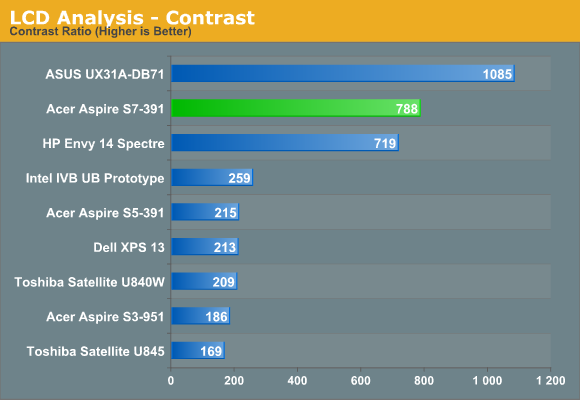
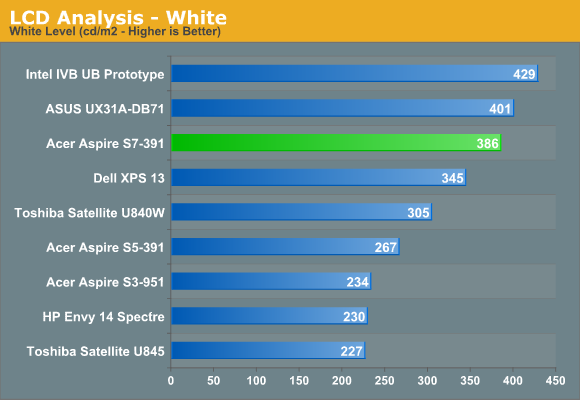
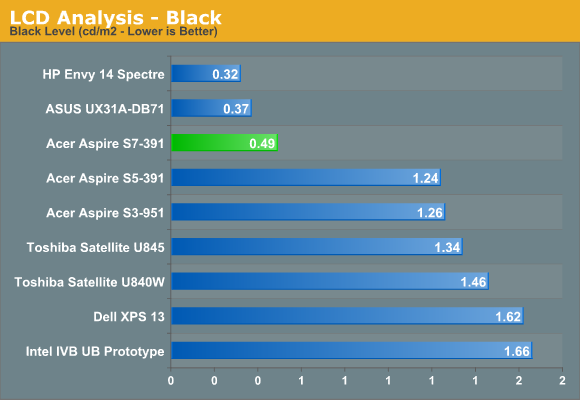
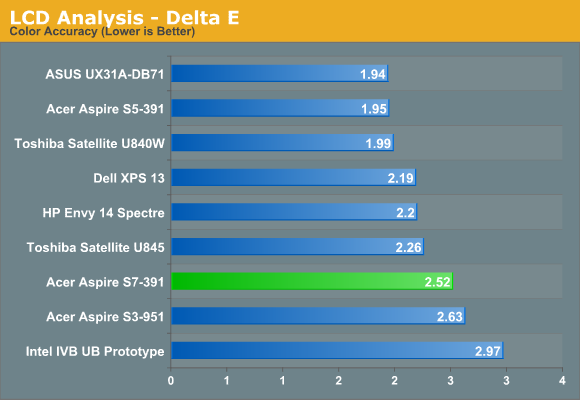
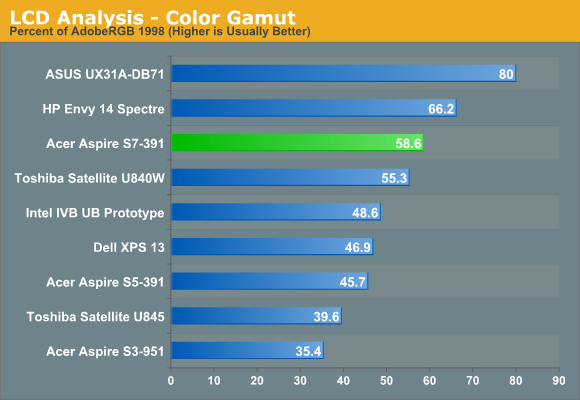
Contrast and brightness are good, though we’ve seen better. As I noted above with the colors being somewhat off before calibration, that carries over post-calibration with an average DeltaE that’s still around 2.5—ideally we’d like to see well under 2.0 for a quality display. The 58.6% color gamut is also less than what we’d like to see, which at a minimum would be the full sRGB color space (around 69%). What’s more, we chose the best calibration result for the above charts; with some of the other targets, the color gamut is a dismal 36%. If you’re okay with the native white point, you get a higher gamut, but if you want to target 6500K or D65, expect to see less than ideal results.










53 Comments
View All Comments
mforce - Monday, January 7, 2013 - link
I find it seriously difficult to justify spending more than 500$ on a laptop. I don't make that much but even if I did ... I'm not really sure what justifies and over 1000 $ price for a laptop, it's just way too much.And the fact that it's an Acer doesn't help things much, let's face it, Acer doesn't really have a premium brand and it's not Apple. If I'll want to sell it right after I buy it I probably won't get more than 1000$ for it.
Besides even cheapo laptops often last quite a long time, I have an Acer I paid 400$ for and it's still running just fine 4 years later.
Romberry - Monday, January 7, 2013 - link
It's a conundrum eh? People like to complain that Windows-based notebooks aren't up to the build quality of Apple's MacBooks that go for well over a grand, but when confronted with a Windows-based notebook that rivals (or meets and in some cases exceeds) the build quality of Apple's MacBooks, the same crowd that bemoans the quality of the sub-500 dollar Windows machines balks.You can have cheap and (hopefully) acceptable, or you can have quality and the price that comes with it. If you're a 500 dollar and under laptop kind of person, then obviously this product is not for you.
Personally? I tend to agree that paying well over a grand for a laptop is very hard to justify for most people. I wouldn't do it. Example? I'm typing this post on an old (five years plus) Dell Inspiron e1505 running a Core Duo (not Core 2) processor , 1680x1050 display, 4 gigs of RAM and a 500 gig Hitachi hard drive with 32 bit Vista Ultimate. Bought two of these in May of 2007 for about 500 dollars a whack new from Dell on special, one for me and one for my daughter. Does everything I need it to do and is comfortable like an old shoe.
I have a Dell Latitude 6400 in the next room (Core 2 Duo P9600 at 2.66 GHz, 8 gigs RAM, 1920x1200 display, 128 gig Samsung 470 SSD primary drive, 500 gig WD Scorpio Black in the expansion bay in place of the optiical drive.) that I paid all of 400 dollars for off lease two years ago. (Added the SSD, upgraded the RAM and installed Win 7 x64.) It mostly sits unused because of the old shoe factor with the Inspiron.
Neither are sleek or easily portable, but they are functional, stable and reasonably fast for what I do with 'em.
I'm not sure just how big a market there is really for high end laptops. Apple sells a lot of MacBooks in terms of units, but in terms of overall market share...not that much. MacBooks are a niche. I think Winbooks built to these high standards are likely to be niche products as well, garnering about the same 3-5 percent share of the overall market as MacBooks. (Of course for many people I think those Apple MacBooks are as much a fashion accessory as they are a PC. Winbooks will likely never have that sort of purposeful snob appeal cachet. Then again, not everyone wants to be a snob.)
blue_urban_sky - Monday, January 7, 2013 - link
I agree with your statement about PC laptops not being able to win as they either feel cheap because they are or are too expensive. I would however like to draw some comparisonsGalaxy S3 ~ £400
iPad4 3g 64gb ~ £650
so £1000 for an ultra-book is not out of place, Don't get me wrong they are all expensive and products like the nexus range start to chalenge these premium prices.
Just so my bias is clear I own a S3, nexus 7 and brought my wife a yoga 13 for xmas as she is a dev and commutes with her laptop on the train so I wanted to find a nice light one. She loves it so money well spent.
mforce - Monday, January 7, 2013 - link
Sure but Nexus devices are cheaper and still quite good. And besides smartphones and tablets are all the rage these days , I don't think such a device can match that.Death666Angel - Monday, January 7, 2013 - link
200€ for a Nexus 7, 300-350€ for a Nexus 4, 400€ for a Nexus 10 and ~150-200€ for about any dual/quad A9 Chinese tablet and smartphone with specs similar to the current high end crop (800p, 1080p, 1200p ips screen @ tablet, 540p or 720p @ smartphone, 4-32GB NAND, 7.4Wh/25Wh batteries etc.). So I would argue that the prices you mention are just as overpriced.blue_urban_sky - Monday, January 7, 2013 - link
Although there is an argument that the high end products profits from manufacturers like Samsung, LG and Apple (tho indirectly) go toward the R&D of next gen hardware. I cannot see those same chinese manufacturers coming out with a flexible display until the tech is matured by one of the larger players at significant cost.Overpriced is strong term, as mentioned in the article the PC community have enjoyed a race to the bottom with little thought to anything other than Power/Price. I for one am glad that companies are looking to push toward aesthetics. If a Bugatti Veyron costs £2M, Aston Martin Vanquish costs £180k and Suzuki Alto costs £6k which one is better to get a pint of milk from the store in? and would you really like to live in a world where there is no "Wow"?
Death666Angel - Monday, January 7, 2013 - link
Then disregard the Chinese offerings, but a Nexus 7 at 200/250€, a Nexus 4 at 300/350€ and a Nexus 10 at 400€ still significantly undercut his listed devices while offering comparable to arguably better specs.As for the rest of your comment that car analogy has nothing to do with my comment and you are reading things into my comment that are clearly of your own mind.
blue_urban_sky - Tuesday, January 8, 2013 - link
The car comparison was just to illustrate that overpriced is highly subjective. The initial prices included the statement that the nexus range were challenging the sector, although google is not interested in profiting off these devices themselves.(http://crave.cnet.co.uk/mobiles/google-nexus-7-sel...
I would think that these ultrabooks are not big earners due to high development costs and low unit sales, So rather than overpriced I think that maybe they are just expensive.
mforce - Monday, January 7, 2013 - link
I was just saying that Acer can't expect people to pay as much for their brand as they do for Apple or Sony ( if you want Windows laptops ) and that's the reality. Given the choice almost anyone would choose an Apple or Sony product ... sure it may not be better and I know that but this is how it works.Also I find the touchscreen on a laptop a bit useless maybe, I don't find myself using it much. I'd rather have a mouse :D
blue_urban_sky - Monday, January 7, 2013 - link
Poor old Acer, If they are trying to up there game good on them I think they know it will be an uphill battle winning consumers over and maybe they have made a product that is very well made with quality parts for that very reason.... Maybe.